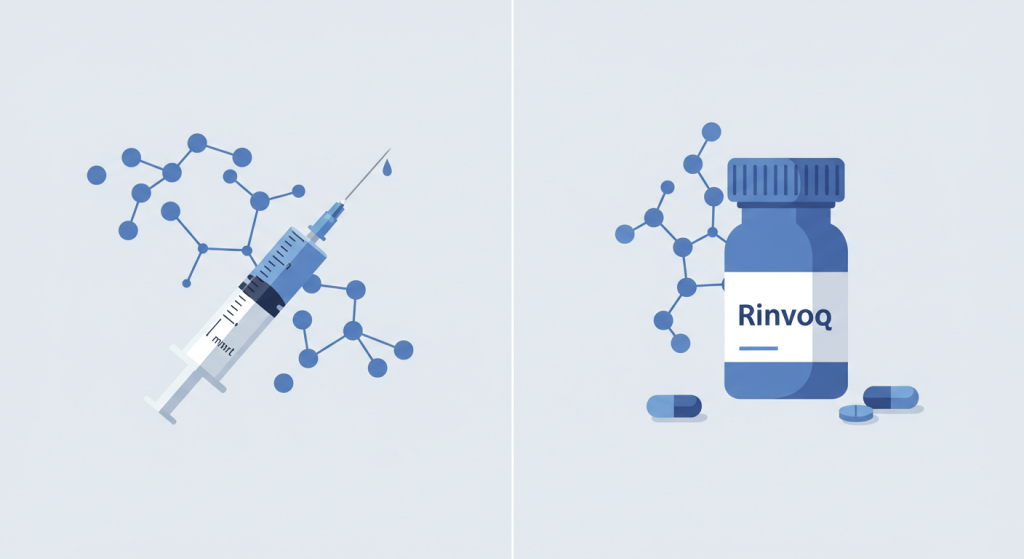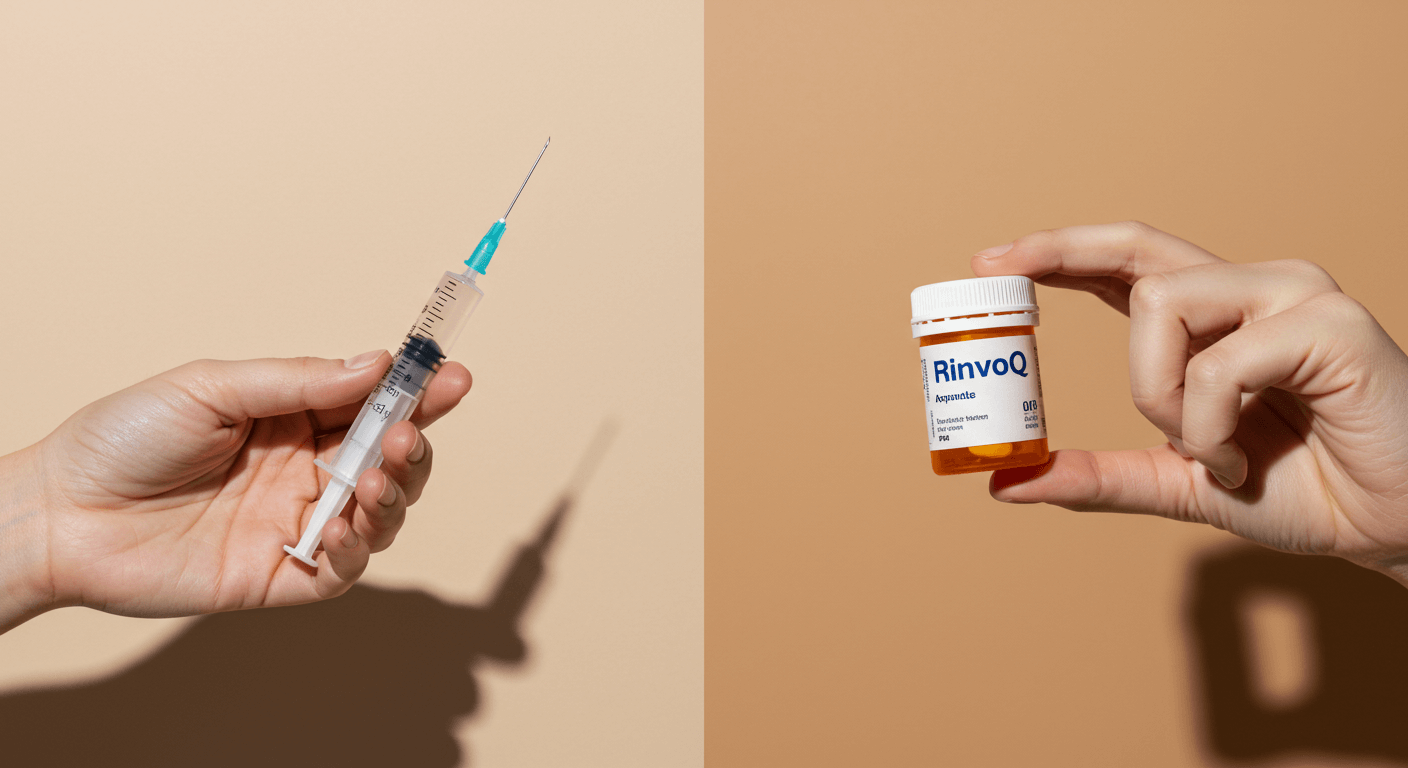Navigating the differences between Humira and Rinvoq can be overwhelming, especially for patients seeking safe, affordable treatments outside the U.S. If you’ve received a prescription for either of these medications and are considering medical tourism to save costs, this guide is for you.
Whether you’re dealing with rheumatoid arthritis, ulcerative colitis, or another immune condition, understanding how these medications work—and how they differ—is key to making an informed decision.
Why Compare Humira and Rinvoq?
Both Humira (adalimumab) and Rinvoq (upadacitinib) are commonly prescribed for chronic inflammatory diseases. However, they work differently, have different administration methods, costs, and risks. Choosing the right one can impact your quality of life—and your wallet.
If you’re exploring lower-cost options through medical tourism in Mexico, it’s essential to understand what you’re taking and why.

How Each Medication Works: Biologic vs. JAK Inhibitor
Humira is a biologic drug that targets TNF (tumor necrosis factor), a protein that contributes to inflammation. It’s injected, usually once every two weeks, and has been a gold standard in autoimmune care for nearly two decades.
Rinvoq, on the other hand, is a JAK inhibitor taken orally. It works by blocking Janus kinase enzymes inside cells, disrupting inflammatory signaling. This newer mechanism has proven effective in multiple clinical trials.
So, what is the difference between Humira and Rinvoq?
Humira is an injectable TNF inhibitor biologic, while Rinvoq is an oral JAK inhibitor. They differ in mechanism, administration, side effects, and cost.
While both medications reduce symptoms and slow disease progression, their mechanisms of action may influence which one your doctor recommends based on your condition severity, treatment history, or tolerance to injections.
Additional information on their mechanisms and usage can be found on trusted platforms like Drugs.com, which offers an at-a-glance comparison for patients.
Effectiveness: What the Data Says
Clinical studies suggest that Rinvoq may offer slightly higher remission rates in certain conditions like rheumatoid arthritis. However, the difference is often marginal, and many experts still consider Humira a reliable first-line treatment.
The Institute for Clinical and Economic Review (ICER) noted that Rinvoq delivers “marginal clinical benefit over Humira at increased cost.” In practice, patient response varies—some may experience better relief with Rinvoq, while others thrive on Humira.
This variation emphasizes the need for personalized treatment decisions, ideally guided by your specialist.
Safety Profiles: What Are the Risks?
Both drugs carry FDA black box warnings—but the nature of the risks differs.
- Humira has well-documented risks of serious infections, tuberculosis, and lymphoma.
- Rinvoq, due to its action on immune pathways, may increase the risk of blood clots, heart events, and certain cancers—risks that recently led the FDA to strengthen its warnings.
Patients with a history of cardiovascular issues or cancer may be more cautiously prescribed Rinvoq, or be advised to stay with Humira.
Always consult your physician and disclose any preexisting conditions before starting either medication.
Cost and Accessibility: Where Rinvoq May Fall Short
In the United States, both Humira and Rinvoq are expensive—costing thousands of dollars monthly without insurance. However, Rinvoq’s newer status and fewer biosimilar alternatives mean less competition and higher out-of-pocket costs for most patients.
Here’s where medical tourism becomes a game-changer.
Many patients are turning to licensed pharmacies in Mexico to access FDA-equivalent medications at a fraction of the U.S. price. Through professional concierge services like Provide Rx Health, patients can legally bring prescriptions such as Humira or Rinvoq across the border—with proper documentation and guidance.

How to Decide Between Humira and Rinvoq
There is no one-size-fits-all answer. But here’s a quick comparison to help you discuss with your doctor:
Administration:
- Humira: Subcutaneous injection
- Rinvoq: Oral tablet
Mechanism:
- Humira: TNF inhibitor
- Rinvoq: JAK inhibitor
Onset of Action:
- Rinvoq may act faster in some patients
Side Effects:
- Humira: Infection risks
- Rinvoq: Cardiovascular and clotting risks
Cost:
- Both expensive in U.S.; Humira has more affordable biosimilar options abroad
What Patients Are Saying
A growing number of patients are documenting their positive experiences using medical tourism to afford Humira or Rinvoq. On platforms like Reddit and patient forums, testimonials highlight how border pharmacy trips have improved access and adherence to life-changing medications.
These aren’t just stories of savings—they’re stories of restored health, freedom from pain, and the power of being informed.
Related Topics You Might Like
If you’re researching Humira and Rinvoq, you may also want to read:
- Medical Tourism in Tijuana: Affordable Prescription Access for Americans
- What Is Medical Tourism for Prescription Medications and How Does It Work?
These articles provide deeper insight into how medical travel can reduce costs without compromising safety.
Can You Take Humira and Rinvoq Together?
No, combining Humira and Rinvoq is not recommended. Both suppress the immune system and using them together can significantly increase the risk of severe side effects, including infections, blood clots, and organ damage.
Always follow your doctor’s treatment plan and ask before making any changes.
Final Thoughts: Empowering Your Treatment Journey
Whether you lean toward Humira or Rinvoq, being informed is the first step to protecting your health and finances. Ask your doctor detailed questions. Research both options carefully. And if affordability is a concern, know that you don’t have to sacrifice quality—safe access through licensed medical tourism may be the answer.
At Provide Rx Health, we don’t sell or prescribe medications—we guide you through the process of accessing your prescriptions safely and legally in Mexico, with U.S. standards of confidentiality and care.
👉 Have a prescription for Humira or Rinvoq?
Contact our team to learn how you can save without compromising your health.




